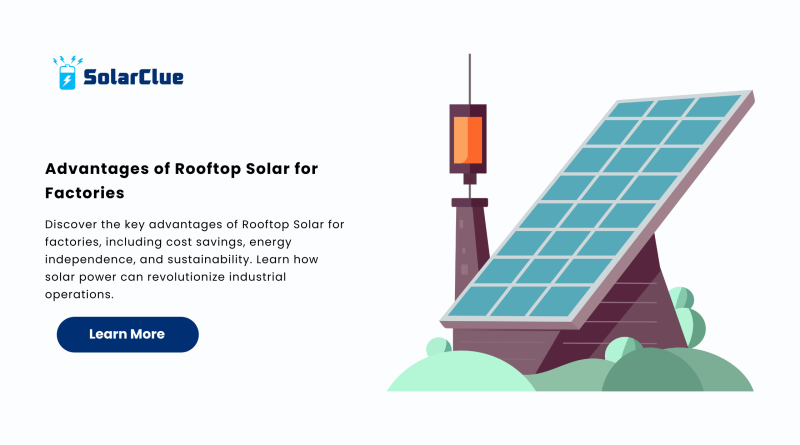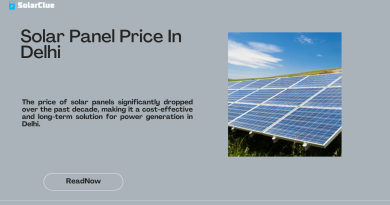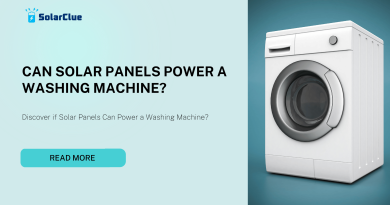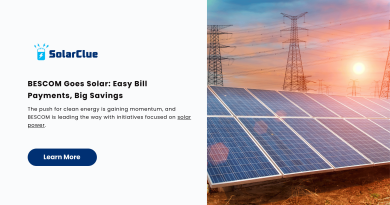Advantages of Rooftop Solar for Factories
As energy prices rise and environmental regulations tighten, factories are under pressure to reduce operational costs while adopting sustainable practices. This is where Rooftop Solar comes into play. Installing a solar power system on factory rooftops is not just an eco-friendly choice—it’s a smart business strategy. From financial savings to energy reliability, there are numerous compelling advantages of Rooftop Solar for factories. Let’s explore them in detail.
Table of Contents
- 1 1. Cost Savings on Electricity Bills
- 2 2. Energy Independence and Reliability
- 3 3. Sustainability and Environmental Impact
- 4 4. Government Subsidies and Tax Benefits
- 5 5. Efficient Use of Idle Roof Space
- 6 6. Enhanced Brand Image
- 7 7. Increased Asset Value
- 8 8. Easy Maintenance and Long-Term Performance
- 9 9. Scalability and Flexibility
- 10 10. Technological Advancements
- 11 11. Reduced Transmission Losses
- 12 12. Strong Support and Service Ecosystem
- 13 13. Quick and Non-Invasive Installation
- 14 14. Flexible Financing Options
- 15 15. Contributing to a Greener Economy
- 16 Conclusion
- 17 FAQs
1. Cost Savings on Electricity Bills
One of the most significant benefits of Rooftop Solar is the drastic reduction in electricity costs. Factories consume large amounts of energy daily, and relying on grid power can result in substantial monthly bills.
With solar, factories can generate their own electricity and use it directly. Over time, this reduces reliance on grid electricity, leading to massive savings. Most businesses recover their initial investment within 3 to 5 years, after which the energy produced is virtually free.
2. Energy Independence and Reliability
Frequent power outages or grid dependency can disrupt factory operations and lower productivity. By installing a solar power system, factories gain energy independence.
Pairing solar with battery storage also ensures that power is available even during outages, enabling seamless 24/7 operation. This stability is especially crucial for industries with critical manufacturing or continuous production lines.
3. Sustainability and Environmental Impact
Switching to solar power significantly reduces your factory’s carbon footprint. Unlike fossil fuels, solar energy is clean and renewable. Every kilowatt-hour generated from a solar panel prevents tons of CO2 emissions annually.
Implementing Solar Rooftop solutions not only aligns your business with global climate goals but also helps meet local environmental regulations and green certifications.
4. Government Subsidies and Tax Benefits
To promote renewable energy, the Indian government offers financial incentives for solar rooftop systems. These include capital subsidies (up to 40% in some regions) and attractive tax benefits.
One notable advantage is accelerated depreciation, which allows businesses to claim 40% depreciation in the first year. This significantly reduces taxable income and boosts ROI.
5. Efficient Use of Idle Roof Space
Factory rooftops often remain unused. Installing solar panels transforms this idle space into a productive, income-generating asset.
It’s a smart way to maximize real estate without needing additional land, which is often expensive or unavailable in industrial zones.
6. Enhanced Brand Image
Today’s customers and investors care about sustainability. Companies using solar power showcase their commitment to the environment and corporate social responsibility (CSR).
Adopting solar improves brand image, builds trust among eco-conscious stakeholders, and can even attract new customers or partners who prioritize sustainability.
7. Increased Asset Value
Properties equipped with Solar Rooftop systems tend to have higher resale value. Potential buyers see long-term value in reduced operating costs and built-in renewable energy systems.
This makes your factory a more attractive and future-ready asset in the industrial real estate market.
8. Easy Maintenance and Long-Term Performance
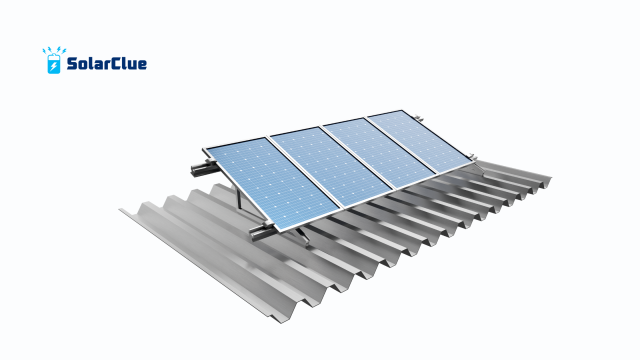
Solar panels are known for their durability and low maintenance requirements. Most systems come with warranties of 25 years or more, ensuring decades of clean energy generation.
Routine cleaning and occasional inspections are all it takes to keep the system performing at optimal levels. Smart monitoring systems allow you to track performance in real-time.
9. Scalability and Flexibility
Solar power systems are modular. You can start small and expand the system as your factory grows or energy demand increases.
This scalability gives businesses flexibility and control over their energy infrastructure without committing to a large upfront project.
10. Technological Advancements
With advancements in solar technology, today’s solar panels are more efficient than ever. High-efficiency panels generate more energy in less space, making them ideal for factory rooftops.
Technologies like bifacial panels, trackers, and hybrid inverters further enhance system output and efficiency.
11. Reduced Transmission Losses
Traditional electricity from the grid undergoes transmission and distribution, resulting in energy losses. With Rooftop Solar, power is generated and consumed on-site, minimizing these losses.
This not only improves energy efficiency but also supports grid stability by reducing load demand.
12. Strong Support and Service Ecosystem
India has a rapidly growing solar ecosystem, with experienced vendors, EPC contractors, and maintenance providers.
From design and installation to servicing and upgrades, expert help is readily available to support your solar journey from start to finish.
13. Quick and Non-Invasive Installation
Modern solar rooftop systems are designed for quick deployment. Installation usually takes a few days and doesn’t interfere with ongoing factory operations.
This ensures minimal downtime and faster return on investment.
14. Flexible Financing Options
Many solar providers offer flexible financing models such as solar leasing or Power Purchase Agreements (PPAs). These allow factories to install solar systems with little or no upfront cost.
Under a PPA, you pay only for the energy you consume—usually at a lower rate than the grid—making solar power accessible to businesses of all sizes.
15. Contributing to a Greener Economy
By adopting solar power, factories play an essential role in India’s transition to a green economy. Renewable energy adoption not only benefits individual businesses but also supports national and global sustainability goals.
This forward-thinking move ensures your business remains competitive and future-ready in an environmentally conscious market.
Conclusion
The advantages of Rooftop Solar for factories go far beyond just cost savings. From gaining energy independence to enhancing brand value and contributing to a cleaner planet, solar energy is a smart investment for forward-looking industrial leaders. Embracing a solar power system transforms your factory into a resilient, sustainable, and economically efficient powerhouse.
If you’re ready to unlock these benefits and power your factory with clean, affordable energy—visit solarclue.com or explore more insights at blog.solarclue.com. Your journey toward industrial sustainability starts here!
FAQs
1. What is the average payback period for a rooftop solar system in factories?
Usually between 3 to 5 years depending on energy usage and system size.
2. Are there any government subsidies for rooftop solar in India?
Yes, up to 40% subsidy is available under various central and state schemes.
3. How much roof space is required for a factory solar installation?
Approximately 100 sq. ft. is needed for every 1 kW of solar power capacity.
4. Can a solar system power an entire factory?
Yes, depending on system size and energy demand, many operations can be powered fully or partially by solar.
5. How long do solar panels last?
Most solar panels come with a 25-year performance warranty and require minimal maintenance.

